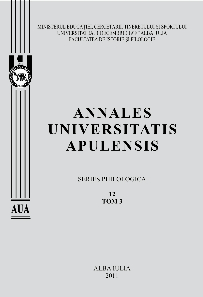Discourse Analysis in the English Military Language
Discourse Analysis in the English Military Language
Author(s): ELENA FuioreaSubject(s): Language and Literature Studies
Published by: Universitatea »1 Decembrie 1918« Alba Iulia
Keywords: Discourse analysis; Military speech; Military culture; Social distance; Social factors
Summary/Abstract: Effective communication is important in everyday life. Knowing the words and grammar itself is not enough. We have to know when to say what and to whom and we must be able to communicate effectively with each other. Different groups of people form the society and the society is intertwined with language into such extent that it is impossible to understand one without the other. The military is considered as one social group with different sub-groups. These groups and sub-groups have their own technical vocabulary and they also have their own ways of expression. Barriers to effective communication are primarily due to language development in succession with progress, lack of training and limited cross-experiences. The purpose of the paper is to analyze several military interviews, with a view to finding whether or not there are any differences in the register used by NCOs and officers, any cultural or individual differences in using grammatical or lexical units, or any unusual characteristic features of military speech. In other words, this is a linguistic exposé of the social hierarchy that has existed amidst the military throughout the ages. We decided to analyze spoken language, instead of original documents or field manuals, because we realized that there would be no colloquial expressions or grammatical irregularities in those documents. Moreover, spoken language is fundamental to any linguistic study and discourse, as the dominant means of communication in society, is the center of our daily lives. We shall approach our analysis with the help of the discourse analysis. We will look at how the choice of verb tenses or other grammatical features affect the structure of discourse. Aspects of cohesion and the discourse markers that are employed are also dealt upon. Specific military issues, such as (the participants, the setting, the topic) and questions related to them, will be taken into account, prior to the analysis of the transcript. In addition to these components we will have in view four different dimensions for analysis, which relate to the factors above. These are: the social distance scale, closely connected with the status of superiority, the status scale, concerned with participant relationships, a formality scale, relating to the setting or type of interaction, two functional scales relating to the purposes or topic of interaction. All speakers have to answer the primary question: Why did you join the military? The environment and culture have a deep impact on the way of communication. In our case, the military environment and military culture, including military customs and traditions are inseparable components of the military and a part of what distinguishes it from civilian life.
Journal: Annales Universitatis Apulensis. Series Philologica
- Issue Year: 12/2011
- Issue No: 2
- Page Range: 285-296
- Page Count: 11
- Language: English

